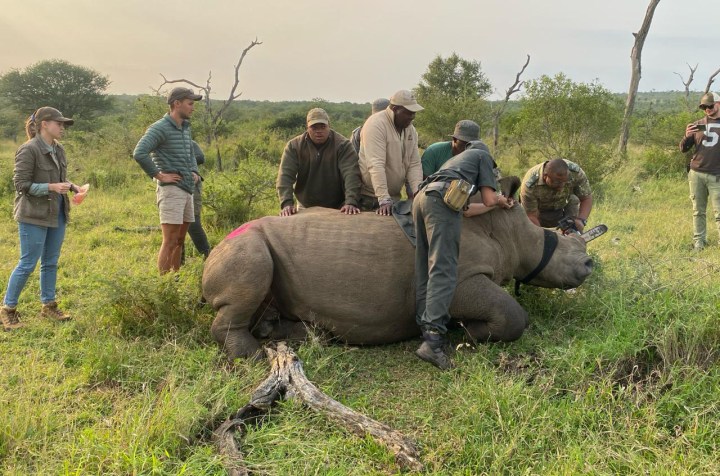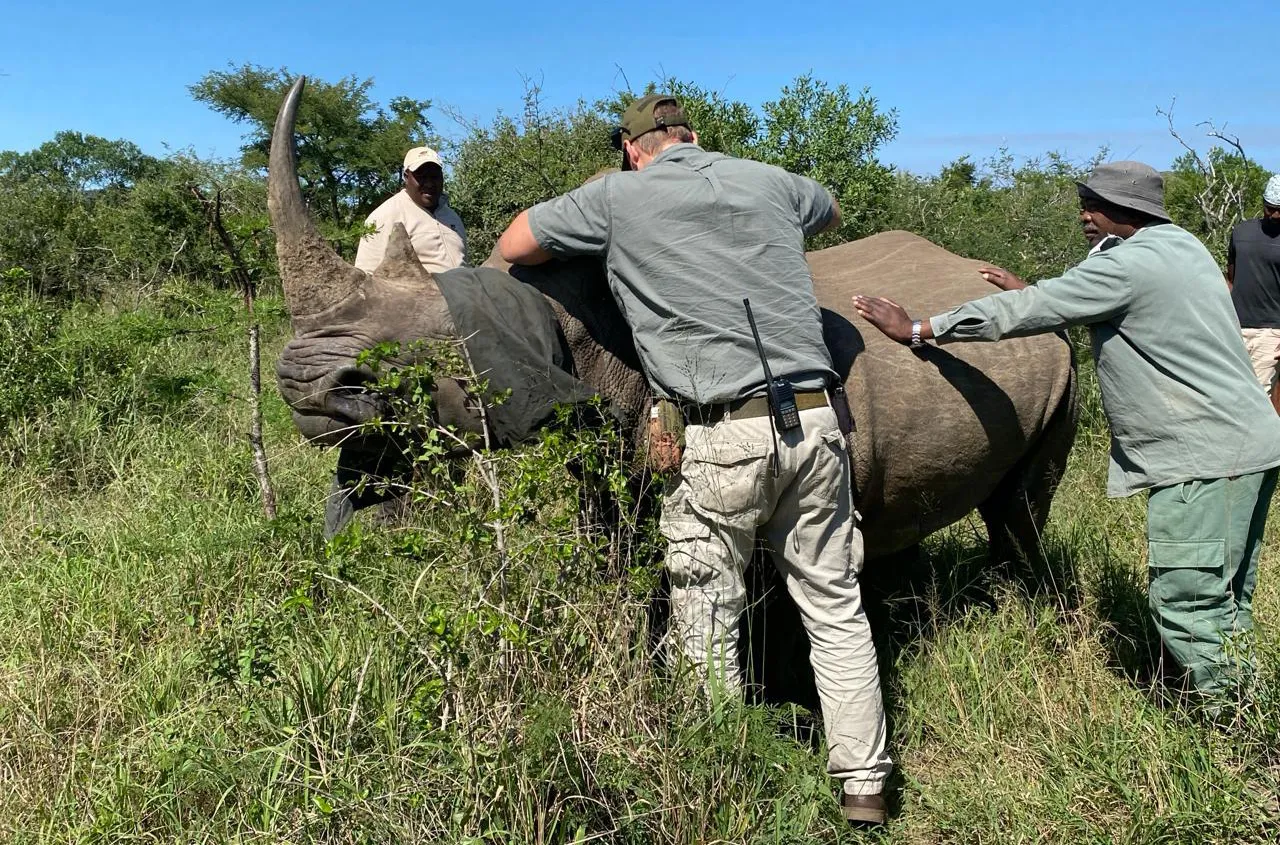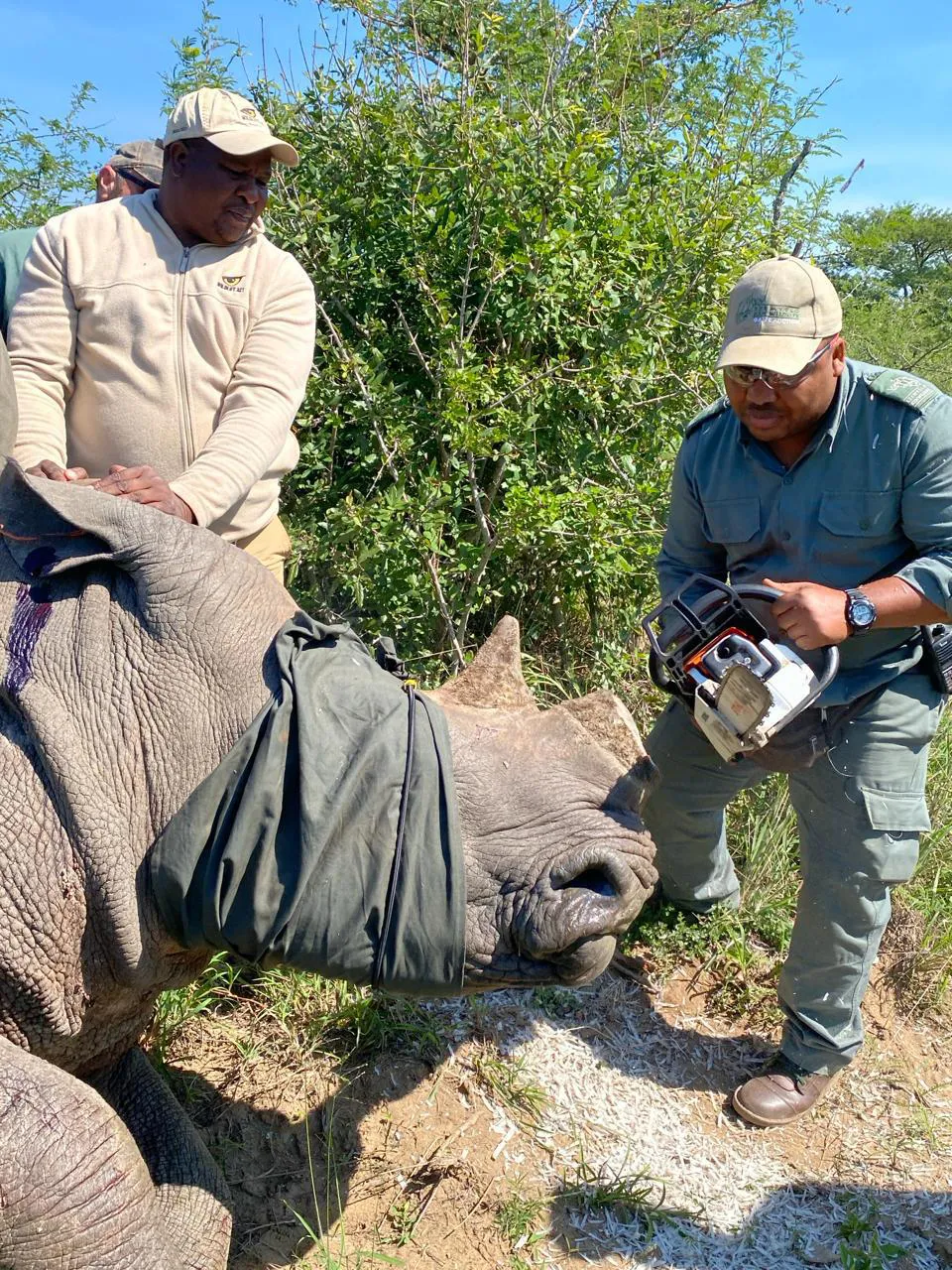SAVING PRIVATE RHINO
Desperation dehorning under way to curb runaway KwaZulu-Natal rhino poaching

In a drastic move to curb rampant rhino poaching in KwaZulu-Natal, the provincial conservation agency has embarked on an immediate programme to cut off the horns of hundreds of the animals in KZN’s largest rhino reserve.
Until recently, the Hluhluwe-iMfolozi Park — proclaimed in 1895 to preserve the world’s last remaining southern white rhinos — was one of the few remaining state-owned sanctuaries in South Africa where visitors could still see significant numbers of rhinos with their iconic horns intact.

Until now, the 96000ha Hluhluwe-iMfolozi Park was home to one of the last significant populations of rhinos in a South African public reserve where rhinos still have their horns intact. (Photo: Ezemvelo KZN Wildlife)
That’s changing. A new dehorning programme, with support from the WWF conservation group, was announced on Tuesday by Ezemvelo KZN Wildlife chief executive Sihle Mkhize.
This follows the killing of 325 rhinos in the province last year, with more than 300 of the animals poached in the 96,000-hectare Hluhluwe-iMfolozi Park alone. The KZN killings accounted for nearly 65% of the 499 rhinos killed nationwide in 2023.
Mkhize said the dehorning operation began on 8 April, in a province where poaching rates had tripled over the past three years.
“It is with a heavy heart that the organisation has decided to dehorn,” Mkhize said. “Rhino dehorning goes against the grain of what we stand for, but the persistent threat posed by poachers has necessitated more drastic measures to protect our rhinos.”
Acknowledging that dehorning was costly and required repeated “trimming” operations every 18 to 24 months as the horns regrow naturally, Mkhize thanked WWF for its “pivotal financial support”.
Read more in Daily Maverick: Two out of three SA white rhinos now in private hands while poachers decimate KZN herds
The agency has been under pressure to follow the example of the Kruger National Park and other government and private sector reserves to dehorn rhinos as one of several strategies to reduce poaching.

Conservation staff use a chainsaw to remove the front horn of a rhino in Hluhluwe-iMfolozi Park. The move follows similar desperate measures in other reserves across the country – including Kruger National Park, where almost 70% of the rhino population was reported to have been dehorned during the 2022/2023 reporting period. (Photo: Ezemvelo KZN Wildlife)
While dehorning has been promoted in several quarters as a drastic but “unavoidable” measure, the latest decision is controversial at both a symbolic and ecological level. This is because their horns are rhinos’ primary defensive tool, while their removal robs tourists of the opportunity to see rhinos in their natural state with horns intact.
The strategy was first adopted in Namibia and Zimbabwe in the late 1980s and early 1990s as a response to the continent-wide poaching crisis and has since been adopted in most of southern Africa.
‘Absolute last resort’
Former Ezemvelo regional ecologist Dr Peter Goodman noted that it was a sad day for rhino conservation and he questioned the wisdom of resorting to such desperate measures.
Goodman acknowledged that dehorning was likely to result in a significant reduction in poaching in the short term — if the entire rhino population in Hluhluwe-iMfolozi was dehorned simultaneously.
However, he noted, the strategy would simply displace poaching to other state and private reserves where rhinos were not dehorned or where dehorning had been discontinued.
He noted that East African rhino range nations viewed dehorning as an “absolute last resort”.
“Kenya, Tanzania and Rwanda are not dehorning their rhinos, yet their populations are still growing.”
“Sadly, the elephant in the room is the lack of law enforcement, political will and legal support. We still see courts releasing rhino poachers on R5,000 bail — and two weeks later they are back poaching in the same reserves.
“The real problem is syndicated crime. This problem is all about security … and corruption. If you have bad actors, the poaching is not going to stop,” Goodman said, noting that only about 80% of a rhino’s horn could be removed safely without damaging the horn growth plate.
As a result, the stumps left behind after dehorning remained economically attractive from a poacher’s perspective.
“I believe we should be focusing instead on sorting out our legal system. We also need more dedicated, honest cops and more effective public-private partnerships among landowners to solve the crisis together.”
Goodman — who was seriously gored by a black rhino in Mkhuze game reserve in 1992 and spent nine days in hospital before recuperating at home for several weeks after surgery — said: “We know already who the main people are. We see politicians… We see rhino horns being smuggled out the country in consular bags.”
Nevertheless, South African National Parks reported last year that nearly 70% of Kruger’s rhino population was dehorned during the 2022/2023 reporting period.
Guardianship strategy
Commenting on the latest KZN dehorning operation, WWF South Africa CEO Dr Morné du Plessis said: “A decision to dehorn is never taken lightly and is only one of a wide range of interventions which together seek to simultaneously remove the potential reward of rhino poaching while increasing the likelihood of being caught.
“The province of KZN has played a critical role in rhino conservation in Africa, which is why we are committing resources towards supporting the authorities in their efforts to protect rhinos. Beyond the dehorning programme, we will also be supporting Ezemvelo in its broader efforts to implement the Ezemvelo KZN Guardianship Strategy for Rhinoceros.”
Read more in Daily Maverick: More than 60% of rhino killings now in KwaZulu-Natal as poachers shift from ‘battered’ Kruger Park
Ezemvelo also committed itself to implementing the recently approved guardianship strategy, which would include:
- Investing nearly R11-million to erect a smart fence to cover a significant portion of the park boundaries where poaching levels are high;
- Financial support of about R40-million by the national Department of Forestry, Fisheries and the Environment to extend the area covered by the smart fence around the park;
- Increasing the numbers of field rangers from 45 to 88;
- Introducing integrity testing among frontline staff;
- Installing trackers in all vehicles;
- Improving relations with adjacent communities;
- Additional helicopter hours and night vision capability; and
- The recent appointment of former section ranger Sthembiso Ndlovu as the senior manager for rhino protection. DM



















 Become an Insider
Become an Insider
We all know who is behind it all but no one stops them…and whos fault is that?? the government …politicians making money from the poaching. Of course China is free to do what they want in Africa,,,,how sad.
Two ways to stop this: hang the poachers in full view of the community as a warning and deterrent. If this is too drastic for the woke folks then round up every single rhino in South Africa and ship them to Australia. Then fill up the game reserves with goats and chickens.
Its not the poachers to blame…theyre just earning a salary….its the Kingpins sitting behind desks and benefiting from these atrocities that need their ba** s cut off?
Time for harsh laws for poachers and thats not jail time.
The criminal syndicates responsible for the poaching need to be rooted out, not just the poachers on the ground. Unfortunately the involvement of politically connected persons has prevented this so far. I hope that the operation in Hluhluwe will succeed in stopping the poaching there.
Thanks for the update on this Tony Carnie. Very sad to see that the park has had to resort to this. The sooner we get rid of corrupt politicians and their syndicated crime the better.
We see rhino horns being smuggled out the country in consular bags.”
Governance by neglect is bad enough – but when government actively participates in national destruction, then hope for the future fails.
De-horn the poachers I think.
Lol!
Thanks for the update. This should have happened years ago. Ideologically Dr Goodman is correct. However, dehorning is the obvious and no brainer solution while the courts and politicians are unable to curb the rate of poaching. It’s disappointing that it’s taken so long to reach this decision.
So called H. sapiens should be renamed H. stultus! That the demand for what is essentially gelatine and coarse hair should come from the ancient civilisations of the East shows that those civilisations and far from civil! I, along with I am sure most on this forum would rather eat grass than profit from the slaughter of these ancient creatures. In addition if our Politicians had an ounce of interest in saving these animals then an immediate upgrade in the penalties for the crime and the posting of military personnel with orders to shoot poachers on site would go a long way to solving the problem. In the interim i agree wholeheartedly that large numbers of Rhino should be sent to Australia where they would be GUARANTEED proper protection.